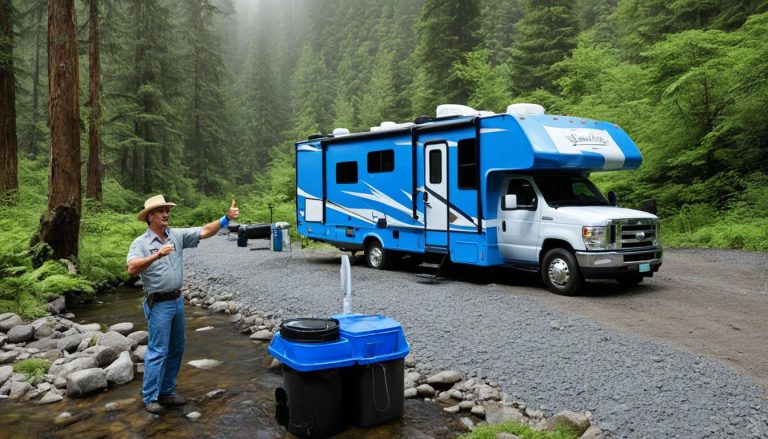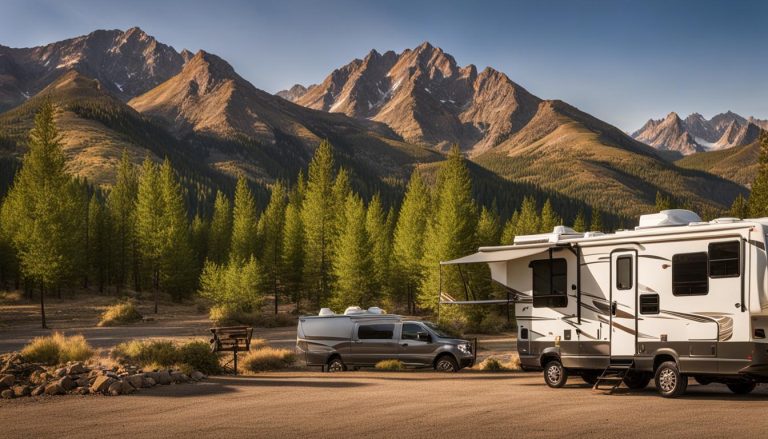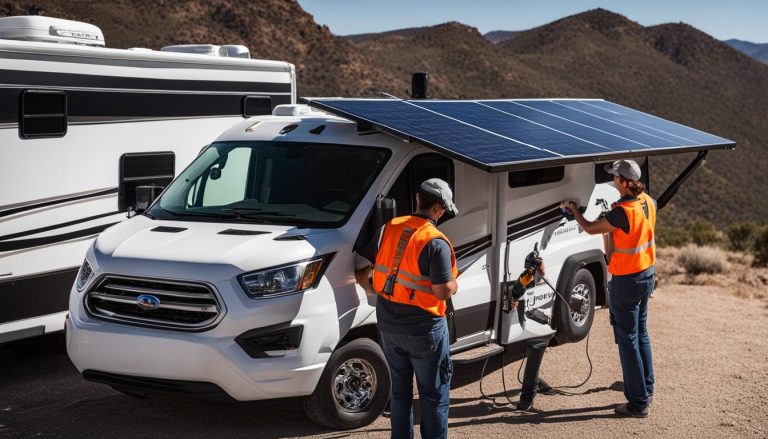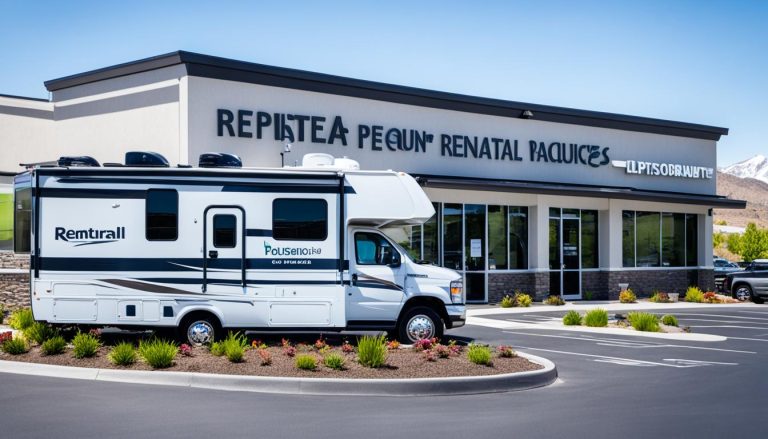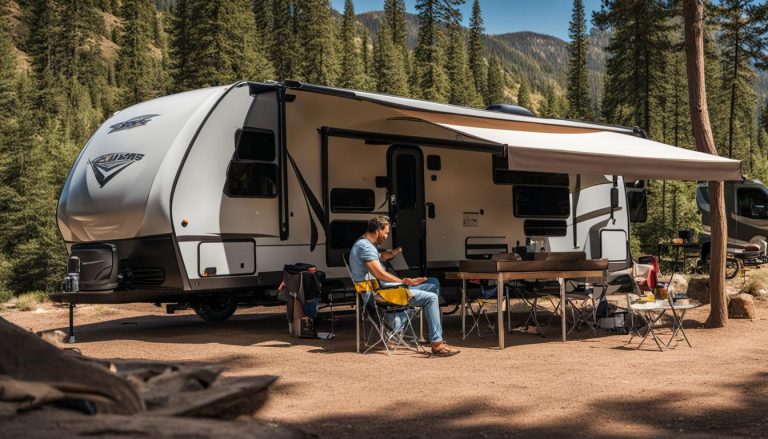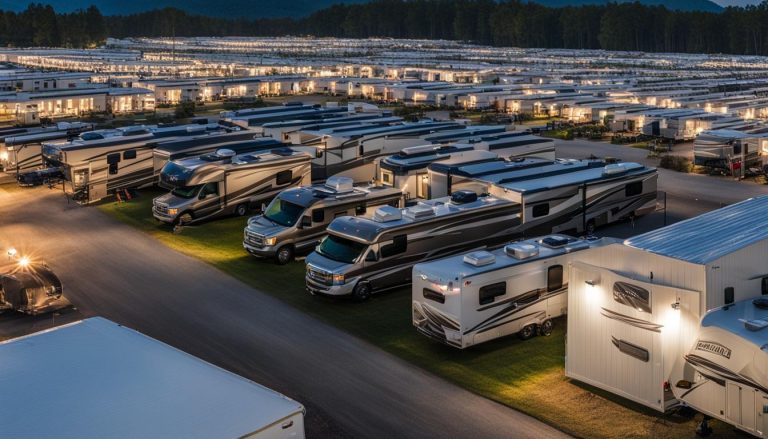Best Internet Service for RV Explained
gorvlifestyle.com and its partners may earn a commission if you purchase a product through one of our links
RV ownership has increased by 62% in the last 20 years, and over 11.2 million American households own an RV. With the rise of remote work and digital nomadism, having reliable internet access while on the road has become crucial for RV owners. In this section, we will explore the different internet options available for RVs and discuss the best internet service providers for RVers.
Key Takeaways:
- Selecting the right internet service is important for RV owners who rely on connectivity while traveling.
- RVers have various options such as satellite internet, campground Wi-Fi, mobile hotspots, and cellular routers.
- Consider factors like location, data usage, and reliability when choosing an internet service.
- Research and compare different internet providers to find the best coverage and pricing options for your RV lifestyle.
Satellite Internet for RVs
If you plan to park your RV in one place for an extended period, satellite internet can be a great option. Unlike cellular data that relies on nearby cell phone towers, satellite internet uses a satellite connection, making it ideal for rural or hard-to-reach areas.
| Satellite Providers | Data Plans | Key Features |
|---|---|---|
| Viasat | Unlimited | Throttling after reaching a certain threshold |
| HughesNet | Unlimited | Throttling after reaching a certain threshold |
| Starlink | Varies | High-speed internet for RVs, plans designed for travelers |
Two major satellite providers in the U.S. are Viasat and HughesNet. They offer data plans with unlimited data, although they may throttle your speeds after reaching a certain threshold. Another option is Starlink, which offers high-speed internet for RVs with plans specifically designed for travelers. Starlink plans come with a one-time hardware fee, but they provide fast, reliable internet even while in motion.
Do you plan to stay in a remote area with limited cellular coverage? Satellite internet is the answer. With a satellite connection, you can enjoy internet access in rural or hard-to-reach areas, ensuring you stay connected while exploring the great outdoors. Two major satellite providers in the U.S., Viasat and HughesNet, offer unlimited data plans, although speeds may be throttled after a certain threshold. Another popular option is Starlink, which provides high-speed internet for RVs, even while you’re on the move. Keep in mind that Starlink requires a one-time hardware fee, but it offers fast and reliable internet access wherever your RV takes you.
Satellite Internet Comparison
| Provider | Plan | Speed | Monthly Cost |
|---|---|---|---|
| Viasat | Unlimited | Up to 100 Mbps | $50-$150 |
| HughesNet | Unlimited | Up to 25 Mbps | $59.99-$149.99 |
| Starlink | Varies | Up to 150 Mbps | Varies |
Benefits of Satellite Internet for RVs
- Reliable internet access in remote areas
- Unlimited data plans available
- Ability to connect multiple devices
- Fast speeds for streaming, gaming, and work
- Flexibility to use internet while traveling
Satellite internet is the perfect choice for RVers who need internet access in rural or remote areas. With options like Viasat, HughesNet, and Starlink, you can enjoy high-speed internet, unlimited data, and the freedom to explore new destinations while staying connected.
Campground Wi-Fi and Free Hotspots
If you’re looking for RV wifi solutions, campground Wi-Fi and free hotspots are options to consider. Many RV campgrounds offer Wi-Fi connections for campers, providing convenience for staying connected while on the road. However, it’s important to note that the quality and reliability of these connections can vary greatly.
While campground Wi-Fi can be a convenient option, it may not always provide the speed and reliability required for work or streaming. The shared nature of campground Wi-Fi can result in slower speeds and intermittent connectivity during peak usage times.
Additionally, relying solely on campground Wi-Fi or free hotspots for your RV internet needs may have limitations. The coverage range of campground Wi-Fi may not extend to every corner of the campground, limiting your access to the internet. In some cases, the Wi-Fi signal may not reach your RV if it’s parked in a more remote or secluded area.
When it comes to free hotspots in larger cities or attractions, they can be viable options for internet access. However, it’s important to be aware of potential security risks when using public hotspots. These networks are often unsecured, making your personal information vulnerable to hackers or malicious actors.
Here’s a quick comparison of campground Wi-Fi and free hotspots:
| Campground Wi-Fi | Free Hotspots |
|---|---|
| Convenient option at RV campgrounds | Available in larger cities or attractions |
| Quality and reliability can vary | Potential security risks |
| May not provide the speed and reliability needed for work or streaming | Unsecured networks |
| Coverage limitations in certain areas of the campground | May not be available in all locations |
While campground Wi-Fi and free hotspots can be convenient for occasional internet use, they may not be the most reliable options for RV internet solutions. If you require consistent, high-speed connectivity for work or entertainment purposes, you may want to consider other alternatives such as satellite internet, mobile hotspots, or cellular data plans.
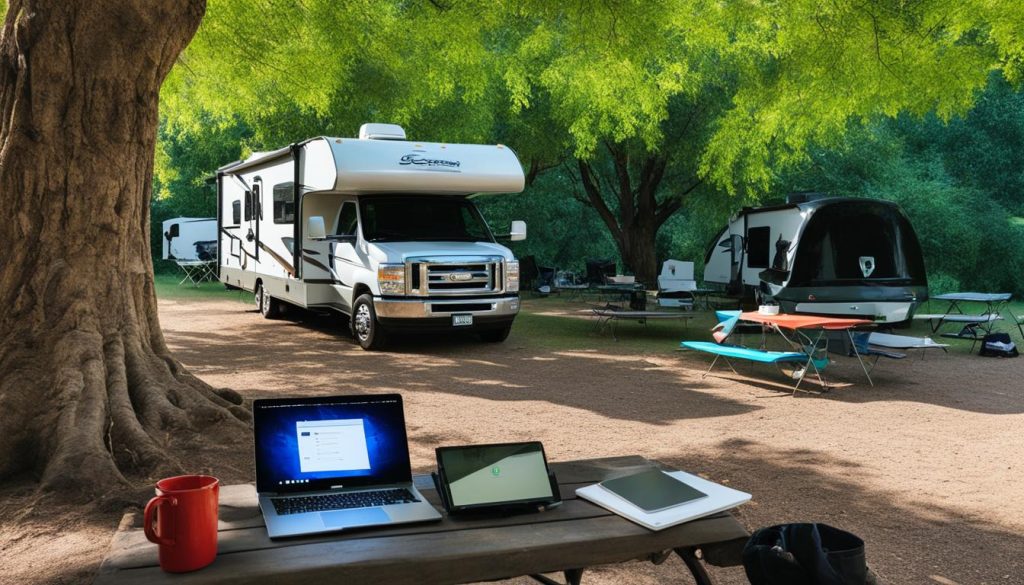
Mobile Hotspots and Cellular Data Plans
Mobile hotspots and cellular data plans are popular options for accessing the internet on your RV. These solutions enable you to stay connected while on the road, ensuring that you can work, stream, and stay in touch with friends and family. Whether you are a digital nomad or simply want to stay connected during your RV trips, mobile hotspots and cellular data plans offer reliable connectivity options.
Most major cell phone providers, such as AT&T, Verizon, and T-Mobile, offer mobile hotspot plans that allow you to use your phone as a Wi-Fi hotspot. Simply enable the hotspot feature on your smartphone, and you can connect your RV and other devices to the internet. This option is convenient and cost-effective, as you can leverage your existing cell phone plan for internet access. With these plans, you can enjoy the flexibility of connecting multiple devices without the need for additional equipment.
Furthermore, cell phone providers also offer dedicated cellular data plans and hotspots specifically designed for RVers. These plans often include unlimited data, allowing you to enjoy uninterrupted internet access. With a dedicated hotspot device, you can establish a Wi-Fi network in your RV, providing connectivity to all your devices. This option is particularly useful if you require a more stable and reliable connection for activities such as video conferencing or gaming. Cellular data plans and hotspots offer the convenience of having a dedicated internet connection for your RV, separate from your personal cell phone usage.
To help you compare the options available, here is a table showcasing some popular mobile hotspot and cellular data plan providers for RVers:
| Provider | Features | Price |
|---|---|---|
| AT&T | Unlimited data, mobile hotspot device available | $XX per month |
| Verizon | Unlimited data, dedicated hotspot device included | $XX per month |
| T-Mobile | Unlimited data, mobile hotspot device available | $XX per month |
These are just a few options to consider when choosing a mobile hotspot or cellular data plan for your RV. It’s important to research and compare providers based on coverage, pricing, and the specific needs of your RV lifestyle. By selecting the right mobile internet solution, you can stay connected and enjoy the freedom of the road without sacrificing your online connectivity.
Cellular Routers and Modems
For RVers with advanced internet needs, such as video conferencing or gaming, using a cellular router with a modem can provide a more stable and high-speed connection. These devices use cellular data to create a Wi-Fi network inside your RV, allowing multiple devices to connect at once. Companies like Nomad Internet offer cellular internet service specifically designed for travelers, providing fast and reliable internet access from multiple carriers without the need for a mobile hotspot. However, these options may come with higher costs and may require a suitable mobile data plan to support your needs.
If you’re looking for a seamless internet experience while traveling in your motorhome, a cellular router and modem can be a game-changer. Whether you’re working remotely, streaming your favorite shows, or enjoying online gaming, these devices offer a more reliable connection than relying solely on campground Wi-Fi or mobile hotspots.
Benefits of Cellular Routers and Modems:
- Stable and high-speed internet connection
- Multiple device connectivity
- Reliable internet access from multiple carriers
With a cellular router and modem, you can stay connected wherever your RV takes you, without worrying about slow or unreliable internet connections. These devices leverage cellular networks to provide internet access, giving you the freedom to work, stream, and stay connected on the go.
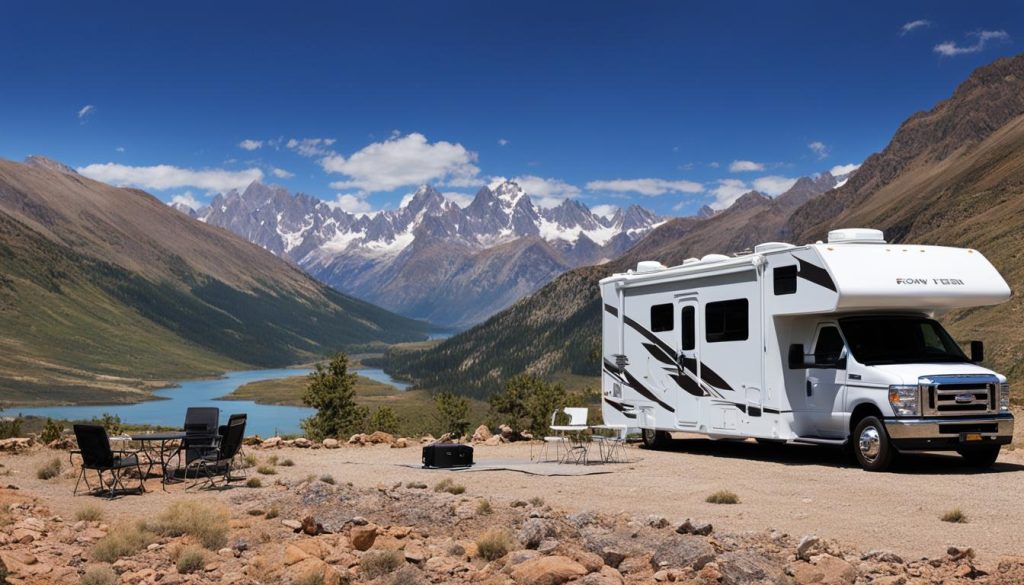
| Company | Features | Pricing |
|---|---|---|
| Nomad Internet | Multiple carrier support Fast and reliable internet Easy device setup |
$XX per month Device cost: $XXX |
| Another Company | Feature 1 Feature 2 Feature 3 |
$XX per month Device cost: $XXX |
Choosing the Best Internet Service for Your RV
When it comes to selecting the best internet service for your RV, it’s essential to consider your specific needs and requirements. Factors like location, data usage, and reliability play a crucial role in making the right choice. Depending on your situation, there are different options available to ensure you stay connected while on the road.
If you plan to have long stays in rural areas, satellite internet can be an excellent choice for your RV. Providers like Viasat and HughesNet offer reliable data plans with unlimited data, making it suitable for remote locations where cellular coverage may be limited. Alternatively, if you frequently travel and need reliable connectivity, mobile hotspots and cellular data plans offered by major providers like AT&T, Verizon, and T-Mobile can provide the necessary internet access for your motorhome.
Researching and comparing various RV internet providers is essential to find the best coverage and pricing options that suit your RV lifestyle. Consider factors like network coverage, data plans, customer reviews, and pricing. By doing so, you’ll be able to make an informed decision and choose the best RV internet service that meets your specific needs.
FAQ
What is the best internet service for RV?
The best internet service for RV depends on your specific needs and requirements. Satellite internet is ideal for long-term stays in rural areas, while mobile hotspots and cellular data plans are suitable for frequent travelers who need reliable connectivity. It is essential to research and compare different internet providers to find the best coverage and pricing options for your RV lifestyle.
What are the RV internet options available?
There are several RV internet options available, including satellite internet, campground Wi-Fi, mobile hotspots, and cellular routers with modems. Each option has its pros and cons, so it’s important to consider factors such as location, data usage, and reliability when choosing the right internet solution for your RV.
Which providers offer satellite internet for RVs?
Two major satellite providers in the U.S. are Viasat and HughesNet. Both offer data plans with unlimited data, although they may throttle your speeds after reaching a certain threshold. Starlink is another option that provides high-speed internet for RVs, with plans designed specifically for travelers.
Is campground Wi-Fi a reliable option for RV internet?
While many RV campgrounds offer Wi-Fi connections for campers, the quality and reliability of these connections can vary greatly. While campground Wi-Fi can be a convenient option, it may not always provide the speed and reliability required for work or streaming.
What are mobile hotspots and cellular data plans?
Mobile hotspots allow you to use your phone as a Wi-Fi hotspot, providing internet access for your RV and other devices. Many major cell phone providers offer mobile hotspot plans. Additionally, providers like AT&T, Verizon, and T-Mobile offer dedicated cellular data plans and hotspots specifically designed for RVers.
How can a cellular router and modem improve RV internet connectivity?
Cellular routers with modems create a Wi-Fi network inside your RV using cellular data, allowing multiple devices to connect at once. These devices provide a more stable and high-speed connection, making them suitable for RVers with advanced internet needs such as video conferencing or gaming.
What should I consider when choosing the best internet service for my RV?
When choosing the best internet service for your RV, consider factors such as location, data usage, and reliability. Think about whether you will be staying in rural or remote areas, how much data you need, and the level of reliability required for your work or entertainment purposes. Research and compare different internet providers to find the best coverage and pricing options for your specific needs.

